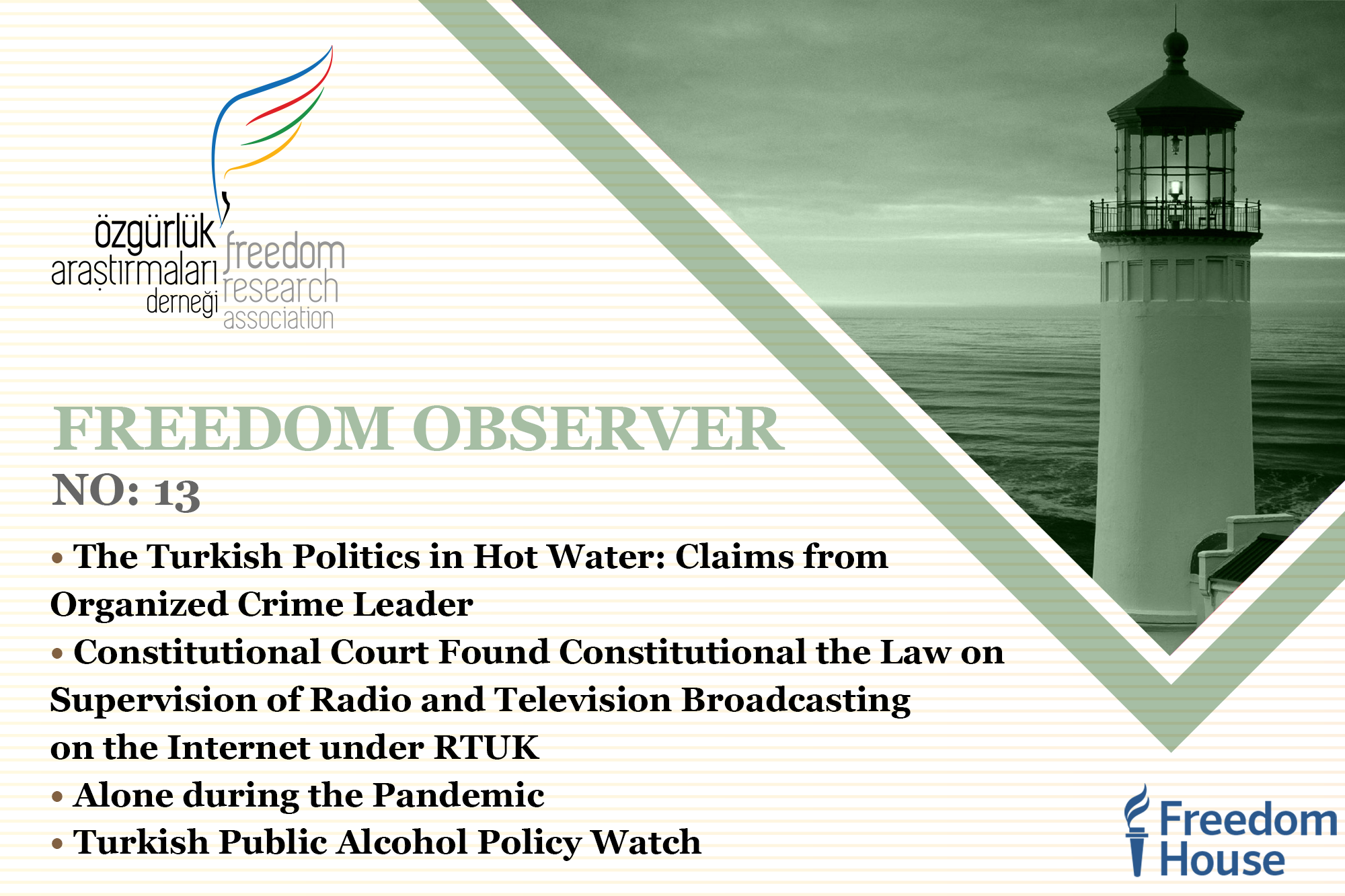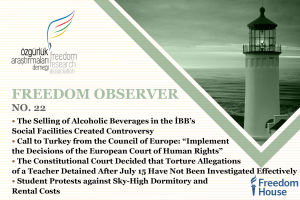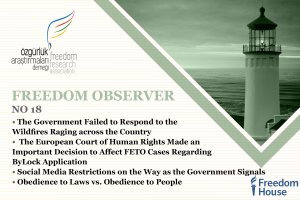The thirteenth issue of the “Freedom Observer” is now available on social media!
📍Follow the link below for the thirteenth issue of ‘Freedom Observer’!
https://mailchi.mp/ozgurlukarastirmalari.com/freedom-observer-13
From Editor-in-Chief
Political and social developments that have come to the fore in the past two weeks show that Turkey, regrettably, is far from normalizing considering its general performance. Among these developments, it was the jaw-dropping revelations made by a mafia figure named Sedat Peker about the connections of mafia with a minister who is still on duty and a former minister with background in police enforcement, which hit the biggest blow to our country’s hope to become a democratic state.
In fact, state-mafia relations in Turkey have not been unknown, at least since the “Susurluk Scandal” that broke out in November 1996. The consequence of the scandal was so pervasive that a deputy and a security bureaucrat had a traffic accident on the Bursa-Istanbul highway and were caught together with an outlaw, who was later learned to work “for the State”, caused widespread protests in civil society. Although the statement of outlaw working “for the state” seems strange, then another outlaw and prominent mafia figure (Alaattin Çakıcı) stated that he worked for the National Intelligence Organization (MIT) during the years he was fugitive abroad.
This latest incident confirms the doubts about the existence of the “deep state in Turkey, meaning that besides the visible (official) face of the state, there is another (hidden) face that is invisible, thus involved in illegal relations and committing a crime “when necessary”. It is hardly surprising that those involved in unlawful businesses are mostly from police enforcement and MIT. In this case, however, it is highly strange that even ordinary citizens have noticed is that the latest incident has yet to mobilize the judiciary. As a matter of fact, at the time of writing these lines, a judicial investigation has not yet been launched on the issue, nor has the TBMM initiated a constitutional investigation process against the minister in question.
Indeed, while mafia-like relations point out the degeneration of the state by freeing itself from rule of law, legal regulations are mobilized to consolidate further degeneration by spreading the state repression on freedom of expression, which has peaked in recent years, to wider areas by the judiciary. As a matter of fact, the provision that was added to the Radio and Television Supreme Council Law in 2018, regarding the control of radio and television broadcasting on the internet, was recently approved by the Constitutional Court. Meanwhile, the practice of the judiciary continues to punish the freedom of expression of all, including politicians who are critical or opposed to the government. Finally, contrary to the general practice in the civilized world, the Republic of Turkey continues to refrain from providing sufficient financial support to the large masses of people who are victims of the closure measures implemented during the pandemic process. Meanwhile, let us not forget to record the cunning attempt of the state to use the “full lock-down” process in May as an excuse to impose a de facto alcohol ban.
The Turkish Politics in Hot Water: Claims from Organized Crime Leader
Sedat Peker, who had a red bulletin on his name for being a criminal organization leader and member, set the political agenda for the past two weeks with his posts on YouTube. In these videos, Peker makes important allegations about interest relationships and incidents of unlawfulness that he entered or witnessed with many politicians, police personnel and businesspeople, including Interior Minister Süleyman Soylu. For example, Peker claimed that Mr. Soylu had assigned him a security police, told him that he would notify him before any arrest warrant issued against him, and that he was involved in the suicide of Silivri Police Chief Hakan Çalışkan.
Peker’s claims remind us of the mafia-politics relations that marked Turkey’s long and unstable decade of the 1990s. Regarding these allegations pointing out to the weakness of the institutional state structure and non-transparent relations, the opposition parties stated that the government and especially Mr. Soylu should make a satisfactory statement.[1] However, Minister Soylu preferred to criticize the opposition parties’ questioning the allegations rather than making a statement against allegations made against him. Mr. Soylu goes on to further criticize opposition parties by stating that “it is the sheer incompetence of opposition parties trying helplessly to do politics by taking a shelter in the allegations of an organized crime leader for whom a red bulletin is requested”.
On the other hand, regardless of these allegations, Peker’s close relationship with the AKP was a well-known fact by the public. As a matter of fact, Sedat Peker, who was convicted of leadership of a criminal organization in 2007 and released in 2014, took a political stance quite close to the government after he was released from prison, and carried out an election campaign for the AKP on 1 November 2015 and the yes campaign for 2017 referendum in which the Presidential government system was voted.[2] Apart from the support he provided to the AKP, Peker did not receive any convictions, although he frequently threatened individuals and groups that were perceives as the AKP’s opponents. For example, in 2016, he threatened the Peace Academics, who called for an end to police violence in Southeast provinces and issued a “We Will Not Be a Party to This Crime” statement by vehemently warning them “We will pour your blood through the gutters and take a shower with it”. Upon this, he was acquitted of the lawsuit filed against him within the scope of “freedom of expression”.[3]
The fact that AKP came to the power with the promise of ending the mafia and maintains its power by establishing close relations with it, let alone ending the mafia, poses a great threat to Turkey’s democracy and the rule of law. In this regard, it should be noted that it is quite appropriate for the opposition parties to come down hard on the allegations and press them to be clarified. However, Mr. Soylu’s targeting of opposition parties in the face of Peker’s allegations does not eliminate increasing concerns in the public opinion. On the contrary, it strengthens prevailing concerns about mafia-politics relations.
Constitutional Court Found Constitutional the Law on Supervision of Radio and Television Broadcasting on the Internet under RTUK
In 2018, with the article no: 29/A of the Law no: 7103 added to the RTÜK Law no: 6112, a rule was introduced for the radio and television broadcasting on the internet to be taken under the supervision of RTÜK. Accordingly, radio, television and on-demand broadcast service providers that only broadcast over the internet, that is, do not have terrestrial or satellite broadcasting and a temporary channel license, are required to obtain a broadcast license from RTUK. In addition, radio and televisions broadcasting from abroad and over the internet, which subject to the jurisdiction of other countries, are obliged to obtain broadcasting licenses for their broadcasts in Turkish and about Turkey. Radio and televisions broadcasting commercially in foreign languages from abroad to Turkey are also subject to licensing obligations. Individual communication is exempted from this obligation. Regardless of the number of viewers and the scope of the revenues, annual fees for licenses are determined in the relevant regulation, which is determined at the range from ten thousand to one hundred thousand TL. For the broadcasts of radio and televisions that do not fulfill the obligation to obtain licenses, the criminal courts of peace may decide to block access or remove the content upon the request of the RTÜK. Judicial fines may be imposed on those who do not comply with these decisions.
It should be noted that obtaining a license for radio and television broadcasting over the Internet is not the only obligation. Others, such as the procedures and principles regarding the presentation, transmission of radio and television broadcasts, obtaining licenses, auditing of broadcasts and implementation of the article, is left to the regulation to be issued by RTÜK and BTK. Therefore, the issue of which body will control the radio and television broadcasts on the internet and the issue of which procedures and principles will be applied is directly left to the regulation.
An annulment case was filed by the deputies of the main opposition party CHP on the grounds that the aforementioned provision is unconstitutional. The Constitutional Court has recently decided that the provision in question is not unconstitutional.[4] The court has also evaluated separately the first four paragraphs of the relevant article regulating the obligation to obtain a broadcast license and the fifth paragraph regarding the issuance of the regulation. It was unanimously decided that the provisions regarding the acquisition of broadcasting license are not unconstitutional. By referring to the rule stipulated in the article no: 26 of the constitution that radio and television broadcasts can be subject to permission, the court has just stated that the legislature has discretionary power in this matter. However, the Court did not consider the claims that the reason for connecting radio and television broadcasts to the permission system is the limited number of frequencies and the limited number of frequencies are used in accordance with the principles of equality and equity. However, as the claims go on, the frequency scarcity problem is significantly eliminated with the opportunities such as cable broadcasting and satellite broadcasting. This was not the case for internet broadcasts, and that it was possible to purchase an unlimited number of domain names. Likewise, the allegations that the purpose of collecting taxes, presented as a justification of the law, cannot be a reason to restrict freedom of expression were not answered.
On the other hand, it was decided that the article, which stipulates that the procedures and principles regarding the presentation, transmission of radio and television broadcasts, obtaining licenses, auditing the broadcasts and the implementation of the article are determined by a regulation to be issued by RTÜK and BTK, is not found unconstitutional by the majority of votes. The five members who were opposed to the decision claimed that leaving the authority to make regulations with bylaw without determining the basic principles in the law is a transfer of legislative power and it is against the principle of restricting fundamental rights with the law. The majority of members, however, confined themselves only to state that the rule is constitutional. After this decision, it is clear that opposition radio and television channels broadcasting on the Internet will be under the pressure of RTÜK, in particular the refusal or denial of license requests.
Alone during the Pandemic
Turkey had started the pandemic process in a very difficult period. In 2019, the exchange rate shock experienced in the previous year could not be overcome, and problems such as the budget deficit and current account deficit were added to the top. Later, the COVID-19 virus and the pandemic process started to drag the Turkish economy into a deep abyss. In order to prevent the spread of the pandemic, many countries have started to implement closure measures. Like other countries, Turkey has implemented closure measures in on-and-off nature. However, the Turkish economy came out of these closures with great wounds. This process, which started in March 2020 for Turkey, continues in 2021 without slowing down. In the last two-week curfew, concrete support was not announced for shopkeepers and people trying to survive with daily income. The stimulus package that was announced was hardly comprehensive and substantial. This is because of the fact that the Turkish economy significantly lacks financial and budgetary tools that would provide these supports. From the depletion of the Central Bank reserves to the pressure exerted on the budget by the projects implemented with the public-private partnership model, which provides very high amounts of guarantees for private actors by the Treasury, posed a great obstacle to the government’s capacity to help citizens.
States, in democratic countries, finance these aids with the taxes they receive from their citizens and are responsible for using this limited resource as efficiently as possible. However, in Turkey, this is hardly the case. It was understood in a short time that the resources in the central budget or in the coffers of other institutions and funds were used inefficiently before COVID-19 arrived.
The support package that the President Erdoğan announced yesterday and the possible Loan (!) Package are related to aforementioned ineffective use of state financial and budgetary resources. The President announced that some business lines in the service sector would be given 5000 TL and 3000 TL for one time only. Coffeehouses, coffee houses, etc. are within the group that will receive 5000 TL. workplaces. In the group for which 3000 TL support will be given, there are plumbers, musicians, etc. When we consider the size of the Turkish economy, we see that the amount of this aid given to people whose workplaces have been closed for a long time and who are disconnected from the working environment stand out as a bad joke. The total of all these aids is only 4 billion 602 million TL. But these aids have a feature; they are the aids donated by the state (!).[5]
All over the world, especially shopkeepers in the service sector are having a very difficult time due to the pandemic and the shutdown of their workplaces. These problems are tried to be overcome with monetary expansion mechanisms, which will cause major problems in the future. In countries like Turkey caught in the pandemic under negative economic conditions, neither monetary expansion nor insufficient government support offers a permanent solution.
Turkish Public Alcohol Policy Watch
The government of Turkey tried to put a blanket ban on liquors without a legal ground and logical justification on April 30[6] and it was lifted on May 17[7]. Considering together with the high tax rates and restrictive alcohol policy since 2013, citizens criticized the government’s decision, and many evaluated the decision as a long-term plan to constitute a ‘lifestyle intervention’ in the press and social media. At that point, legal experts, journalists, NGOs, liquor store owners, alcohol companies, social media users criticized and did not obey the government’s de facto alcohol ban.
The latest initiative of Freedom Research Association titled ‘Turkish Public Alcohol Policy Watch’ conducted a gigantic digital campaign against the ban and invited people not to obey any de facto liquor ban. The campaign reached more than 4 million people on social media and covered by many TV channels and newspapers. When political parties were too afraid to raise concerns against the liquor ban in a mostly conservative society, a civil initiative successfully conducted a digital campaign and the government stepped back. Liquor sales were possible until May 7.
After the new NGO law (aka. The Proposal on the Prevention of Financing and Proliferation of Weapons of Mass Destruction) civil society organizations were concern and felt threated by the new regulations[8]. Moreover, civil society organizations were left alone against the government by the political parties in the campaign against the liquor ban. This was a great opportunity for Turkish civil society to show their strength and solidarity fighting against the erosion of rule of law and human right violations after a regulation which threatens their very existence.
The government continued to its endeavors to find new way to put another ban on liquors, they couldn’t succeed until May 7. The government issued a new degree and put a new ban to all non-essential good sales on May 7. The justification for the new ban is to prevent unfair competition and intensity in supermarkets. Nonetheless, we all know this is just another excuse for them to continue to constitute the liquor sales ban.
The only consolidation at this point, the government had to remember to rule by law. Putting a ban on a fundamental freedom without a legal base is unacceptable even for Turkish standards. The government had to create a legal ground for the ban and
couldn’t separate liquors from other non-essential goods thanks to people who fought for their freedoms. After May 17, the liquor sales will be possible again like all other non-essential goods, but it seems the government determined to restrict liquor sales so this struggle will continue for a long time.
[1] https://www.bbc.com/turkce/haberler-turkiye-57047640
[2] https://www.evrensel.net/haber/305724/sedat-peker-evet-kampanyasina-tehditleriyle-katildi
[3] https://tr.sputniknews.com/turkiye/201807131034272040-sedat-peker-beraat/
[4] AYM, E.2018/99, K.2021/14, 03/03/2021, (RG. T. 07.05.2021, S. 31477)
[5] https://t24.com.tr/haber/canli-erdogan-salgin-musibetine-karsi-verdigimiz-mucadelenin-tek-amaci-84-milyon-insanimizin-sagligini-korumak-ve-gelecegini-guvence-altina-almaktir,952899
[6] Freedom Observer #12, Freedom Research Association https://mail.google.com/mail/u/0/#search/freedom+observer/FMfcgxwLtsvQXNKMWkWJsRsFQQrnCtTr
[7] Turkey to gradually lift restrictions next week, Anadolu Agency
[8] Freedom Observer #5, Freedom Research Association





